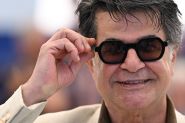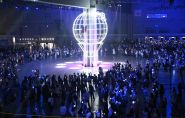It is already midnight, and the city is collapsing under the weight of the imminent apocalypse. The following text aims to be a sketch, in words and music, of what the future seems to promise.
It is already midnight. The city seems numb beneath a cloak of ink. The stars struggle to adorn this black veil that stretches into infinity. Everything is calm. Too calm. Nothing suggests that the ultimate storm is about to be unleashed. A chilling breeze discreetly slithers through the deserted streets, brushing against the facades of sleeping houses, sweeping the empty squares as if searching, one last time, to erase the traces of a vanishing existence. Then it fades away, and with it, the world relinquishes its own breath.
It is already midnight. The sky is ripped apart. An incandescent light cleaves the night, descending with unspeakable brutality upon the city that was. Roofs ignite, walls crumble, engulfed in an eruption of fire and ash. The volcano awakens. It releases its apocalyptic fury, obliterating what, until now, seemed eternal. The world collapses. The horizon melds into a glowing red, a promise of a dawn that will never rise. The heavens appear to observe, indifferent, the twilight of humanity and the tragic end of Homo sapiens. Only Mozart, with the tragic grandeur of the Dies irae ("Day of Wrath") from his unfinished Requiem, could have captured the intensity of this ultimate terror.
https://www.youtube.com/watch?v=0T7eMctuJLQ
It is already midnight. The ruins crackle under the relentless onslaught of the cataclysm. The air is heavy, saturated with extinguished lives and vainly uttered laments. The contorted faces of those who still sought meaning in this interminable night barely stand out. These souls now wander into infinity, struck by the echoes of forgotten or neglected prophecies. Then, suddenly, everything falls silent. A solemn silence descends, a prelude to an inevitable verdict. A truth that no one can evade.
It is already midnight. The throne of God dominates the scene of the Last Judgment. The Creator then surveys the work of His hands, disfigured by human folly. His eyes scan the earth, ravaged by senseless wars and oceans of blood spilled without mercy. Man, to whom He had entrusted creation, has perverted this sacred gift. On that day, the mountains, the seas, the heavens themselves testify against this indifferent humanity. Global warming, this fever that the beast of man, in its pride, chose to ignore, is the damning evidence of its corrosive voracity.
The Eternal Judge casts an intense gaze upon His creation, before turning His attention to the devastation it has wrought: forests reduced to ashes, oceans tainted by the poison of greed, mountains eroded under the weight of machines, fertile lands turned into arid deserts, extinct species, dried-up rivers. But more than that, His gaze encompasses the sacrificed innocence of children on the altar of murderous wars, the grieving mothers, the men crushed under the rule of tyranny, and this insatiable selfishness that drives humanity to relentlessly ravage its surroundings. No detail escapes His omniscient gaze, no pain, not a whisper, not a single tear shed in the shadow of despair. One could then see in Schönberg's Verklärte Nacht not only an exploration of emotional distress and human tragedy but also a haunting reflection of this bitter reality. Yet, where light, this time, seems out of reach.
https://www.youtube.com/watch?v=yzSaOWPBFqA
It is already midnight. It is already time.
And yet, morning seems so close. But it is not dawn that appears on the horizon; it is the end of an illusion. The illusion that man could escape the very laws of nature. He sought to become master and has become a slave to his own excesses. The world is extinguishing not in a cry of rebellion, but in a tragic acceptance of the inevitable. The lesson is simple and cruel: humanity, in its relentless advance, has lost the sense of the sacred. And at this fateful hour, it is already too late to retreat.
Midnight is not just an hour; it is a moment of truth. And in this raw truth, man, reduced to a spectator of his own downfall, realizes that the greatest tragedy is not the end of the world, but the ignorance of what could have saved him. God will not pronounce the final verdict, for the world has already judged itself. Believing it could escape divine justice, humanity has simply escaped itself. It has allowed that divine spark within it to extinguish, that flame which could have illuminated even the deepest darkness.
For it is not God who has abandoned Man, but Man who has abandoned God, and thus, all chance of salvation. In this final breath, everything dissolves: light, life and even the hope of redemption. Beethoven's Ode to Joy, once a symbol of humanity's aspiration for transcendence, will no longer resonate. Alas.
https://www.youtube.com/watch?v=q0EjVVjJraA
It is already midnight. It is already too late.
Read more




Comments